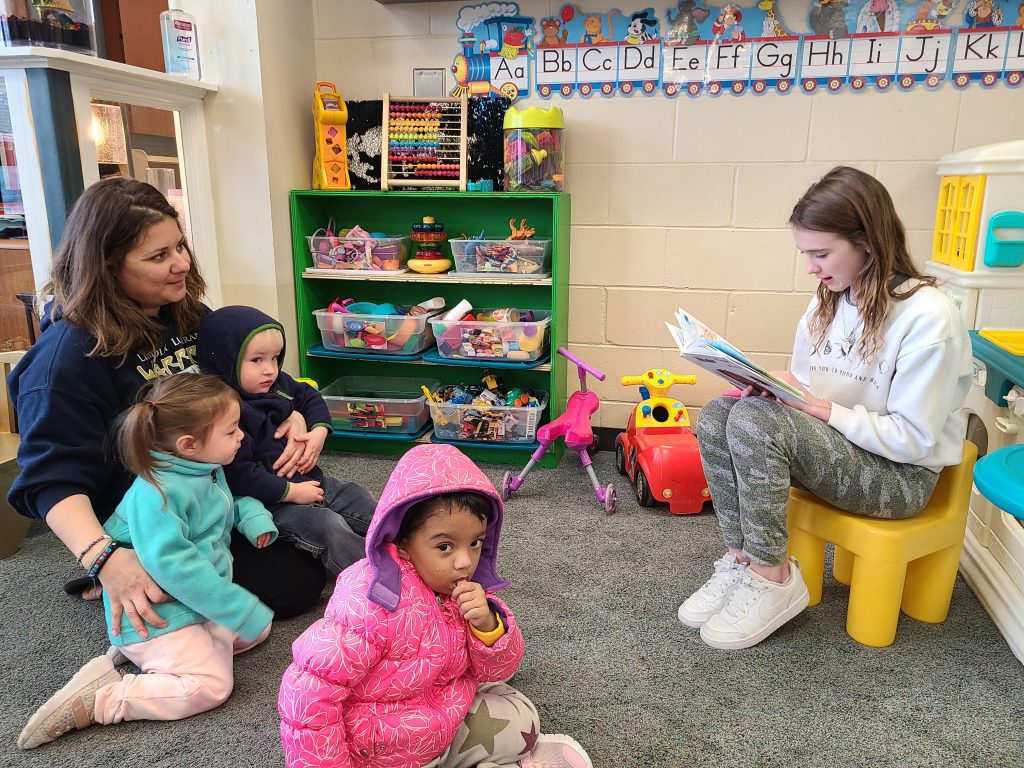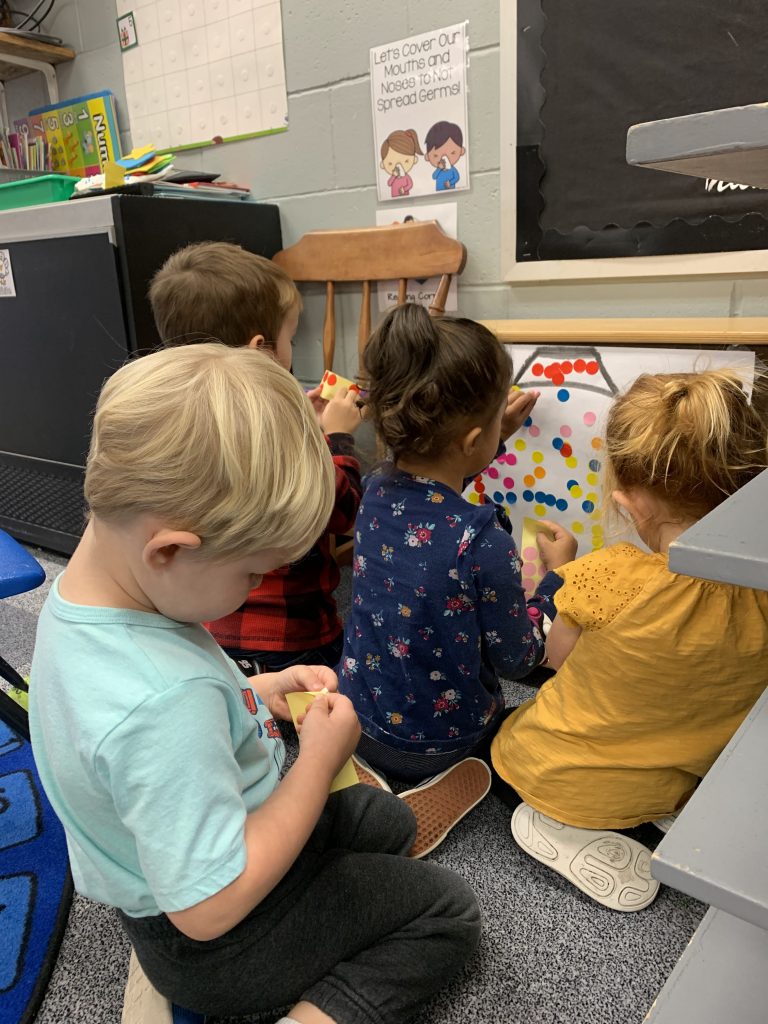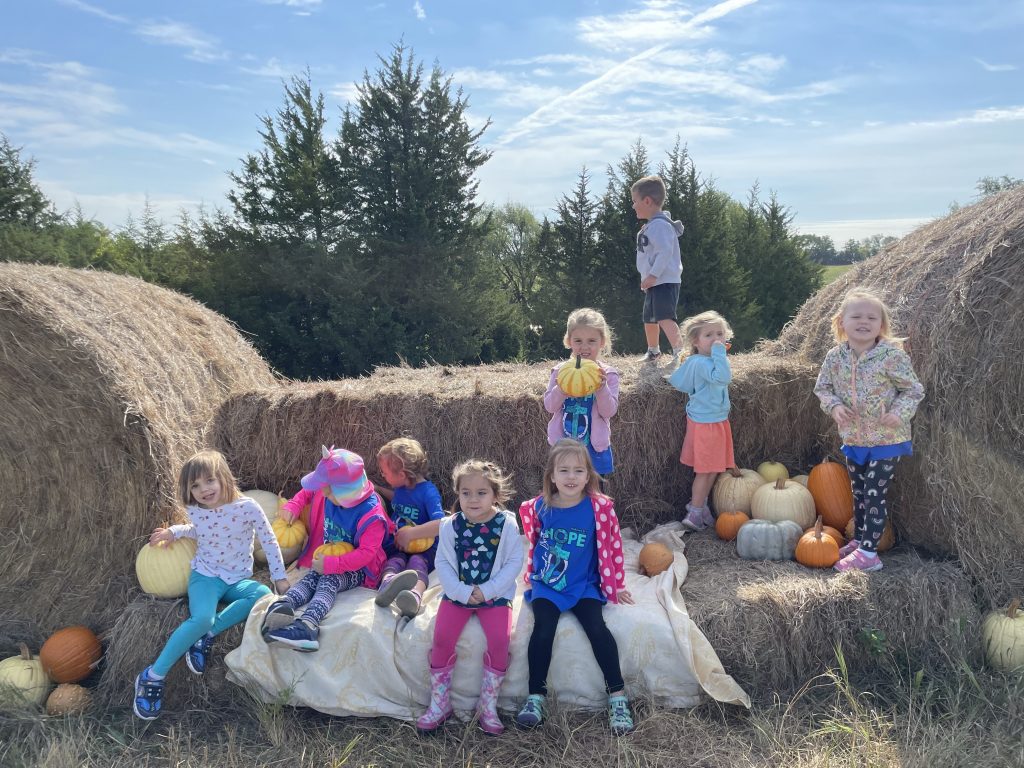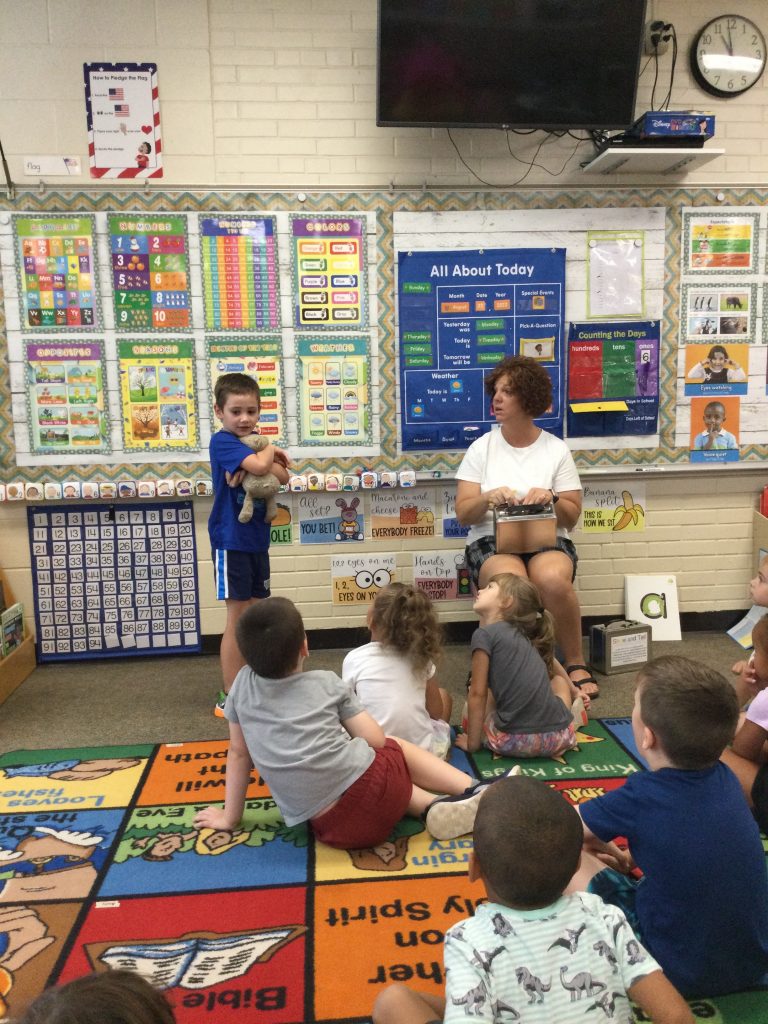The purpose of Trinity’s Toddler program is to nurture the whole child with God’s love and provide the child with spiritual, social, physical, emotional, and intellectual growth at developmentally appropriate stages.
Bumblebee Toddlers
Ms. Cassie Uhrich
Students in the Bumblebee Toddler Class will learn about the following topics:
- Creative Arts – Colors, music, movement, and drama
- Emotional and Social – Form relationships with other adults, making friends with peers, interacting with other children, solving problems by expressing feelings and seeking adults’ help, regulating own emotions/feelings, beginning to learn manners
- Fine Motor Skills – Build with blocks, color, dig, eye/finger/hand coordination, finger paint, glue, hold large crayons, paints with brush, use spoon and fork
- Gross Motor Skills – Use general body movements, hold balls, catch, walk, crawl, hops, jump, kick, march, run, scoot, slither, squat, climb, toss, and roll
- Health – learn to dress for weather, wash hands, go potty, healthy eating
- Language/Literacy Skills – Comprehend simple language; follow simple directions of one or two steps; use language to express thoughts and needs; name familiar people, animals, and objects; engage in simple conversation with others; show interest in books; demonstrate interest in writing skills; sing familiar songs
- Math – Verbally count some numbers; follow simple position directions such as in, on, and up; begin to understand shapes
- Cognitive Skills – Show interest in working on a task for short periods of time; be persistent in an activity until successful; show curiosity and motivation to learn; recognize and look for familiar persons, places, and objects when named; match similar objects; engage in dramatic play by imitating others and using real objects as props

Butterfly Toddlers

Mrs. Margeaux Maul
Students in the Butterfly Toddler Class will learn about the following topics:
- Creative Arts – Colors, music, movement, and drama
- Emotional and Social – Form relationships with other adults, making friends with peers, interacting with other children, solving problems by expressing feelings and seeking adults’ help, regulating own emotions/feelings, beginning to learn manners
- Fine Motor Skills – Build with blocks, color, dig, eye/finger/hand coordination, finger paint, glue, hold large crayons, paints with brush, use spoon and fork
- Gross Motor Skills – Use general body movements, hold balls, catch, walk, crawl, hops, jump, kick, march, run, scoot, slither, squat, climb, toss, and roll
- Health – learn to dress for weather, wash hands, go potty, healthy eating
- Language/Literacy Skills – Comprehend simple language; follow simple directions of one or two steps; use language to express thoughts and needs; name familiar people, animals, and objects; engage in simple conversation with others; show interest in books; demonstrate interest in writing skills; sing familiar songs
- Math – Verbally count some numbers; follow simple position directions such as in, on, and up; begin to understand shapes
- Cognitive Skills – Show interest in working on a task for short periods of time; be persistent in an activity until successful; show curiosity and motivation to learn; recognize and look for familiar persons, places, and objects when named; match similar objects; engage in dramatic play by imitating others and using real objects as props
The purpose of Trinity’s Preschool program is to educate the whole child and provide for the student’s spiritual, moral, social, physical, emotional, and intellectual growth.
Preschool
Mrs. Connie Dirks
Students in the Preschool Class will learn about the following topics:
- Math – Add, count, read graphs, matching, have a concept of more/less/same, comprehend and recognize numerals; know numerals in sequence, know one-to-one correspondence, know ordinal position, patterns, sorting, estimation, height, length, measuring tools, recognize shapes
- Science – Animal names, animal homes, amphibians, birds, fish, insects, pets, reptiles, eggs, life cycles, foods from nature, seeds, tastes (senses), plants, people, habitats, foods, light, magnets, sound, water, air, planets, rocks, sky, sun, moon, stars, weather
- Social Studies – Accept responsibility for the classroom, demonstrate suitable interaction with peers and adults, build things, build friendships, communicate, recognize community helpers, express feelings, identify family members, follow directions, help others in need, able to separate from parents, sensitive to others’ feelings, share, respect the rights of others, identify types of transportation, understand behaviors (acceptable and unacceptable), compromise and discuss to resolve conflict, cooperate with others to finish a task
- Language Arts – Articulate sounds, listen, participate in group discussion, respond with personal data, develop picture vocabulary, rhyme, sing, express social speech, vocalize
- Reading – Use auditory discrimination, compose stories to go with picture, recognize letters, respond to and experience books, recognize visual discrimination (upper/ and lowercase letters), write for a purpose
- Writing – Journal, print letters, print name, use representational writing (pictures), trace
- Problem Solving – Apply information to a new situation, arrange in a series, aware of cause/effect relationship, compare and contrast, creative/imaginative, find more than one solution to a problem, observe and make discoveries, persistent with task, recall sequence of story events, show curiosity and desire to learn, sort, use planning to problem solve
- Music – Singing, finger plays, rhythm, musical instruments, participating in worship services
- Gross Motor – Use general body movements, bounce ball, catch, crawl, hop, jump, kick, march, has rhythm, run, scoot, skip, slither, squat, climb up and down, balance, throw, toss
- Fine Motor – Build with blocks, color, cut with scissors, design/draw, dig, eye/finger/hand coordination, finger paint, glue/tape, hold pencil/crayon, paint with a brush, develop handwriting skills, make prints, put puzzles together, trace
- Emotional – Express emotions purposely, has confidence, interested in and easily participate in routine activities, learn about emotions, make believe about situations, make believe with objects, monitor emotions, show independence, stands up for rights, take pretend roles

Pre-Kindergarten

Mrs. Amber Christensen
Students in the Pre-Kindergarten Class will learn about the following topics:
- Emotional – Express emotions purposely, has confidence, interested in and easily participate in routine activities, learn about emotions, make believe about situations, make believe with objects, monitor emotions, show independence, stand up for rights, take pretend roles
- Fine Motor – Build with blocks, color, cut with scissors, design/draw, dig, eye/finger/hand coordination, finger paint, glue/tape, hold pencil/crayon, paint with a brush, develop handwriting skills, make prints, put puzzles together, trace
- Gross Motor – Use general body movements, bounce ball, catch, crawl, hop, jump, kick, march, has rhythm, run, scoot, skip, slither, squat, climb up and down, balance, throw, toss
- Language Arts – Articulate sounds, listen, participate in group discussion, respond with personal data, develop picture vocabulary, rhyme, sing, express social speech, vocalize
- Math – Add, count, read graphs, match, recognize money, has concept of more/less/same, comprehend numerals, recognize numerals, know numerals in sequence, know one-to-one correspondence, know ordinal position, patterns, sorting, estimation, height, length, measuring tools, recognize shapes
- Music – Singing, finger plays, rhythm, musical instruments, participate in worship services
- Problem Solving – Apply information to a new situation, arrange in a series, aware of cause/effect relationship, compare and contrast, creative/imaginative, find more than one solution to a problem, observe and make discoveries, persistent with task, recall sequence of story events, show curiosity and desire to learn, sort, use planning to problem solve
- Reading – Use auditory discrimination, compose stories to go with picture, recognize letters, respond to and experience books, recognize visual discrimination (upper and lowercase letters), write for a purpose
- Science – Animal names, animal homes, amphibians, birds, fish, insects, pets, reptiles, eggs, life cycles, foods from nature, seeds, tastes (senses), plants, people, habitats, foods, light, magnets, sound, water, air, planets, rocks, sky, sun, moon, stars, weather
- Social Studies – Accept responsibility for the classroom, demonstrate suitable interaction with peers and adults, build things, build friendships, communicate, recognize community helpers, express feelings, identify family members, follow directions, help others in need, able to separate from parents, sensitive to others’ feelings, shares, respect the rights of others, identify types of transportation, understand behaviors (acceptable and unacceptable), compromise and discuss to resolve conflict, cooperate with others to finish a task